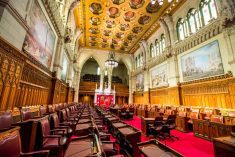The Manitoba government has rejected Ottawa’s offer to reconsider letting Manitoba’s carbon tax stand, rather than imposing the federal plan.
That’s sure to disappoint Manitoba farm groups who say they prefer Manitoba’s plan over Ottawa’s. But the Manitoba government doesn’t trust the federal government on this issue.
“The Liberals are talking out of both sides of their mouth,” a statement issued by Manitoba Premier Brian Pallister’s office Oct. 26 says. “One day they (federal government) issue a statement criticizing the province and the next day they’re saying let’s sit down and talk about it. We’ll judge the federal government based on their actions because history has shown Manitobans can’t trust them at their word, especially when it comes to taxes.”
Read Also

KAP flags risky trade for Manitoba farmers
Tariffs, market access uncertainty, trade diversification and export infrastructure top the agenda at Keystone Agricultural Producers (KAP) annual meeting.
Intergovernmental Affairs Minister Dominic Le Blanc offered Manitoba an olive branch Oct. 25, saying in a statement Ottawa is open to working with Pallister to fight climate change.
“If the Premier would like to reconsider rescinding Manitoba’s proposal, we would give that due consideration, and take another serious look at what Manitoba has proposed,” Le Blanc said in an email.
Many Manitoba farm groups say they prefer Manitoba’s carbon tax because in addition to exempting fuels farmers burn running equipment, fuels used to dry grain and heat barns would be exempted too.
The federal plan only exempts fuel to run farm equipment.
It also exempts 80 per cent of the fuel used to heat greenhouses.
“We’ve tried for over a year to negotiate with Ottawa in good faith, but they never accepted Manitoba’s proposal to implement a flat carbon pricing approach that would have reduced more emissions and saved Manitobans $520 million over five years,” Pallister’s office said. “They refused to work with us co-operatively and maintained their threat to impose a double tax on Manitobans, while failing to acknowledge the significant investments we are making in green energy.
“It’s evident the Liberals care more about imposing a rising tax on Manitobans than working together to address the larger issue of fighting climate change. That’s why we’re saying yes to a Made-in-Manitoba Climate and Green Plan and no to a made-in-Ottawa carbon tax.”
Any prolonged uncertainty, coupled with rising costs under the federal carbon tax plan, could lead to drastic consequences, Manitoba Agriculture Minister Ralph Eichler warned in an email Oct. 26. “Our hope is that the federal government will recognize their plan is wrong for Manitoba producers,” he said.
Pallister told reporters Oct. 4 he was scrapping Manitoba’s flat $25 a tonne carbon tax because the federal government was imposing its own.
Since Ottawa doesn’t respect Manitoba’s carbon tax Manitoba has two choices, Pallister said.
“Either you’re going to stand up for Manitobans in a year (2020), when the feds come in as they threaten to do with a higher carbon tax, or you do it now and we’re doing it now,” he said.
Prime Minister Justin Trudeau announced details of the federal government’s carbon tax and rebate program Oct. 22.
It applies to Manitoba, Saskatchewan, Ontario and New Brunswick — provinces that haven’t developed their own carbon price plan, or the plan doesn’t meet Ottawa’s standards.
Under the federal plan starting in April 2019 the price of carbon emissions in Manitoba will be $20 a tonne, rising $10 a year to $50 by 2022.
Under that schedule Ottawa’s carbon tax would be $30 a tonne in 2020 — $5 a tonne more than Manitoba’s proposed carbon tax.
Both carbon price plans would exempt fuels used to run farm equipment.
Pallister has complained Ottawa has a two-tiered plan, giving other provinces such as Quebec more flexibility than Manitoba.
Trudeau says all the revenue collected from Ottawa’s carbon price plan will be returned to citizens and non-profit organizations. He also says most Manitobans will receive more in carbon price rebates than they’ll pay in carbon taxes.
Under Pallister’s plan the revenues would be used to cut personal and corporate income taxes by $260 million over five years.
Pallister argued Manitoba’s carbon tax, would be more effective than Ottawa’s because it started off higher and takes into account the billions of dollars Manitobans have, and will continue to invest, in almost carbon-free hydro electric power.
“We know that putting a price on pollution is good for the economy and good for the environment, which means that it’s good for the middle class,” Le Blanc said. “Our government worked with provinces and territories for two years to put a price on pollution, giving them the flexibility to design an approach that made sense for their province.”
See more details on this issue in the Nov. 1 issue of the Manitoba Co-operator.
















